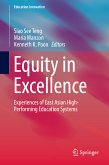Against this background, The Nordic Education Model traces the rise of neo-liberal policies that have been enacted by those who believe the School for All ideology does not produce the knowledge and skills that students need to succeed in an increasingly competitive and global marketplace. It examines the conflict between these two ideas and shows how neo-liberal technologies affect the Nordic model in different ways.
The authors also show how social technologies are being interpreted in different ways in actual school practices. This process of translating national regulations into internal sense builds on the values in the culture to which they are introduced.
In the end, this book reveals that a Nordic model can constitute a delicate balance between traditional values, institutionalized practices, and contemporary, neo-liberal forms of governance and policies. It may be argued from a new institutional perspective that the main structures of the Nordic educational model will sustain as long as the deeply rooted Nordic culture survives in the globalised society.
Dieser Download kann aus rechtlichen Gründen nur mit Rechnungsadresse in A, B, BG, CY, CZ, D, DK, EW, E, FIN, F, GR, HR, H, IRL, I, LT, L, LR, M, NL, PL, P, R, S, SLO, SK ausgeliefert werden.









